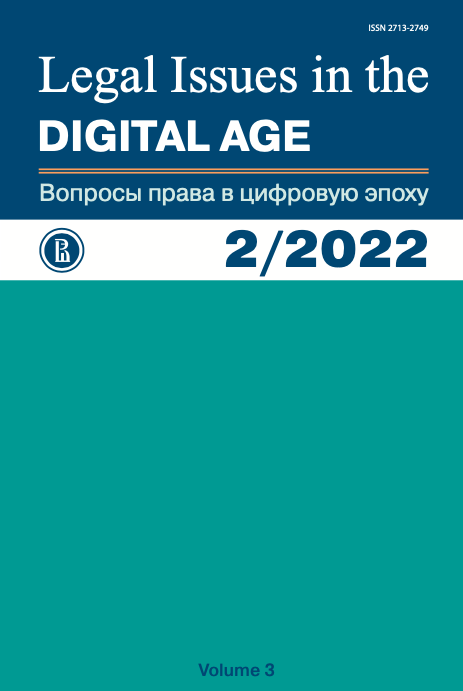The Legal Status of Crypto-Asset Issuers in the Light of the Proposed MICA Regulation
Abstract
The progress of modern digital technologies raises the question on the necessity of common regulatory mechanism applicable to crypto-asset issuers and embracing comprehensive regulation of the status of all parties involved in crypto-asset trade. However, regulation of major parties provided by the V. AML Directive has been inconsistent and abstract.1 Under pressure of policy-makers and professional community, the European Commission has come up with the long awaited draft MICA regulation2 designed to ensure universal regulation of crypto-assets across all member states of the European Union (hereafter EU) including those of the European Economic Area (hereafter EEA). The proposed draft purports to harmonize fragmented regulation of crypto-assets which EU member states were forced to introduce for lack of
EU-wise regulation of this institution. The main purpose of this paper is to analyze the newly established institutions including categorization of crypto-assets covered by MICA. The main functional aspects of the crypto-asset offering process including a requirement to publish a white paper are examined in this context. The supervisory role of the European Banking Authority (EBA) in respect of the issuers of significant crypto-assets is specifically discussed. Based on this analysis, the author concludes that the application of MICA is handicapped by a number of problems discussed in more detail further on. Thus, MICA is not straightforward in its definitions of cryptoassets which are rather general, and contains no detailed explanation of cooperation between the competent authorities in the EU and third countries to prevent money laundering and terrorist financing. The following research methods were used by the author in writing the paper: formal legal method, comparison, synthesis, analysis, analogy, induction and deduction methods.
References
Blandin A., Cloots A. et al. (2019) Global Cryptoasset Regulatory Landscape Study. Cambridge: University Press, 122 p. DOI: https://doi.org/10.2139/ssrn.3379219
Bočánek M. (2021) First Draft of Crypto-Asset Regulation (MiCA) with the European Union and Potential Implementation. Financial Law Review, issue 22, pp. 37–53. DOI: https://doi.org/10.4467/22996834FLR.21.011.13979
Burilov V. (2019) Regulation of Crypto Tokens and Initial Coin Offerings in the EU de lege lata and de lege ferenda. European Journal of Comparative Law and Governance, vol. 6, pp. 146–186. DOI: https://doi.org/10.1163/22134514-00602003
Ferrari V. (2020) The regulation of crypto-assets in the EU — investment and payment tokens under the radar. Maastricht Journal of European and Comparative Law, vol. 27, pp. 325–342. DOI: https://doi.org/10.1177/1023263X20911538
Ferreira A., Sandner P., Dünser T. (2021) Cryptocurrencies, DLT and crypto assets: the road to regulatory recognition in Europe. Available at: https://ssrn.com/abstract=3891401 (accessed: 09.10.2021) DOI: https://doi.org/10.2139/ssrn.3891401
Hobza M. (2021) Challenges of Law in Business and Finance. 13th International Scholar Conference “Law in Business of Selected Member States of the European Union”. Prague: TROYAS, pp. 13–22.
Hornuf L., Kück T., Schwienbacher A. (2021) Initial coin offerings, information disclosure, and fraud. CESifo Working Paper No. 7962. Germany: Munich Society for the Promotion of Economic Research — CESifo GmbH, pp. 1–46.
Houben R., Snyers A. (2018) Cryptocurrencies and blockchain. Legal context and implications for financial crime, money laundering and tax evasion. Brussels: European Parliament, Policy Department for Economic, Research and Quality of Life Policies, 101 p.
Irwin A., Turner A. (2018) Illicit Bitcoin transactions: challenges in getting to who, what, when and where. Journal of Money Laundering Control, vol. 21, no. 3, pp. 297–313. DOI: https://doi.org/10.1108/JMLC-07-2017-0031
Moreno S., Seigneur J., Gotzev G. (2020) Handbook of Research on Cyber Crime and Information Privacy. Hershey: Information Science Reference, 400 p.
Sidak M., Slezáková A. (2014) Regulácia a dohľad nad činnosťou subjektov finančného trhu. Bratislava: Wolters Kluwer, 238 p. (in Slovak)
Winkler M. (2004) Legal aspects of conducting business by Slovak banks within the common market of the EU (on the example of the Czech Republic). Business Entrepreneurship and Marketing in the New European
Economic Area: Almanac of an International Conference on the Occasion of the 35th Anniversary of the Faculty of Business held under the auspices of Ivan Miklos, Deputy Prime Minister of the Slovak Republic.
Bratislava: EKONÓM, pp. 703–710.
Winkler M. (2018) Regulation of deadlines for issuing decisions in proceedings conducted pursuant to the Financial Market Supervision Act. Law governing conducting business in selected member states of the European Union. International Conference. Law governing conducting business in selected member states of the European Union. Almanac of the 10th International Scholar Conference. Prague: TROYAS, pp. 277–284.
Zetzsche D., Arner D., Buckley R. (2020) Decentralized Finance. Journal of Financial Regulation, vol. 6, issue 2, pp. 172–203. DOI: https://doi.org/10.1093/jfr/fjaa010
Zetzsche D., Arner D., Buckley R. (2020) The evolution and future of data-driven finance in the EU. Common Market Law Review, vol. 57, issue 2, pp. 331–360. DOI: https://doi.org/10.54648/COLA2020030
Zetzsche D., Arner D., Buckley R., Annunziata F. (2021) The Markets in Crypto-Assets regulation and the EU digital finance strategy. Capital Markets Law Journal, vol. 16, issue 2, pp. 203–225. DOI: https://doi.org/10.1093/cmlj/kmab005
Authors who publish with this journal agree to the Licensing, Copyright, Open Access and Repository Policy.










